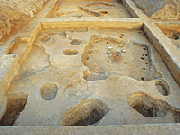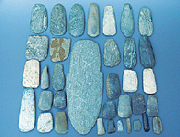| Art Q&A > Archeology > links |
|
|
The prehistoric site at Beifudi in Yixian County of North China's Hebei Province Period: Neolithic Period (about 7000-8000 years ago)
The site, first discovered in 1985, is by far one of the
most A great number of dwellings and ash-pits have been excavated at the site; at the location for sacrifices, jade-pieces, stone pieces, potteries, and especially a lot of carved ceramic masks have been found. The masks are so far the earliest of their kind and the most well-preserved masks from prehistoric times, providing new important materials for the study of primitive religion and wizardry, and shedding light on early Neolithic culture in North China and the spiritual life of ancient people.
The prehistoric site at Beifudi is located at the conjunction of the three
prehistoric cultures of the Central Plains, North, and Shandong, which makes it
important in the study of the comprehensive relations between the three
cultures. The site is the remains of a large Neolithic village, making it a
significant resource in studying the lifestyle of ancient
people. |
||
All rights reserved. Reproduction of text for non-commercial purposes is permitted provided that both the source and author are acknowledged and a notifying email is sent to us. |
||
 |

 Site description
Site description

 Significance
Significance